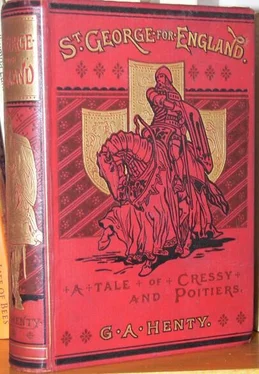G. Henty - St. George for England - A Tale of Cressy and Poitiers
Здесь есть возможность читать онлайн «G. Henty - St. George for England - A Tale of Cressy and Poitiers» весь текст электронной книги совершенно бесплатно (целиком полную версию без сокращений). В некоторых случаях можно слушать аудио, скачать через торрент в формате fb2 и присутствует краткое содержание. Жанр: Старинная литература, на английском языке. Описание произведения, (предисловие) а так же отзывы посетителей доступны на портале библиотеки ЛибКат.
- Название:St. George for England: A Tale of Cressy and Poitiers
- Автор:
- Жанр:
- Год:неизвестен
- ISBN:нет данных
- Рейтинг книги:3 / 5. Голосов: 1
-
Избранное:Добавить в избранное
- Отзывы:
-
Ваша оценка:
- 60
- 1
- 2
- 3
- 4
- 5
St. George for England: A Tale of Cressy and Poitiers: краткое содержание, описание и аннотация
Предлагаем к чтению аннотацию, описание, краткое содержание или предисловие (зависит от того, что написал сам автор книги «St. George for England: A Tale of Cressy and Poitiers»). Если вы не нашли необходимую информацию о книге — напишите в комментариях, мы постараемся отыскать её.
St. George for England: A Tale of Cressy and Poitiers — читать онлайн бесплатно полную книгу (весь текст) целиком
Ниже представлен текст книги, разбитый по страницам. Система сохранения места последней прочитанной страницы, позволяет с удобством читать онлайн бесплатно книгу «St. George for England: A Tale of Cressy and Poitiers», без необходимости каждый раз заново искать на чём Вы остановились. Поставьте закладку, и сможете в любой момент перейти на страницу, на которой закончили чтение.
Интервал:
Закладка:
The king was much grieved when he heard of the death of Artevelde, and held a council with his chief leaders. At first, in his indignation and grief, he was disposed to march upon Ghent and to take vengeance for the murder of his ally, but after a time calmer counsels prevailed.
The Flemings were still in rebellion against their count, who was the friend of France. Were the English to attack Ghent they would lose the general good-will of the Flemings, and would drive them into the arms of France, while, if matters were left alone, the effect of the popular outburst which had caused the death of Artevelde would die away, and motives of interest and the fear of France would again drive them into the arms of England. The expedition therefore returned to England, and there the king, in a proclamation to his people, avoided all allusion to the death of his ally, but simply stated that he had been waited upon by the councils of all the Flemish towns, and that their faithful obedience to himself, as legitimate King of France, was established upon a firmer basis than ever.
This course had the effect which he had anticipated from it. The people of Flanders perceived the danger and disadvantage which must accrue to their trade from any permanent disagreement with England. They were convinced by the events which soon afterward happened in France that the King of England had more power than Philip of Valois, and could, if he chose, punish severely any breach of faith toward him. They therefore sent over commissioners to express their grief and submission. The death of Artevelde was represented as the act of a frantic mob, and severe fines were imposed upon the leaders of the party who slew him, and although the principal towns expressed their desire still to remain under the rule of the Count of Flanders, they suggested that the ties which bound them to England should be strengthened by the marriage of Louis, eldest son of the count, to one of Edward's daughters. More than this, they offered to create a diversion for the English forces acting in Guienne and Gascony by raising a strong force and expelling the French garrisons still remaining in some parts of the country. This was done. Hugo of Hastings was appointed by the king captain-general in Flanders, and with a force of English and Flemings did good service by expelling the French from Termond and several other towns.
The character of Jacob van Artevelde has had but scant justice done to it by most of the historians of the time. These, living in an age of chivalry, when noble blood and lofty deeds were held in extraordinary respect, had little sympathy with the brewer of Ghent, and deemed it contrary to the fitness of things that the chivalry of France should have been defied and worsted by mere mechanics and artisans. But there can be no doubt that Artevelde was a very great man. He may have been personally ambitious, but he was a true patriot. He had great military talents. He completely remodeled and wonderfully improved the internal administration of the country, and raised its commerce, manufactures, and agriculture to a pitch which they had never before reached. After his death his memory was esteemed and revered by the Flemings, who long submitted to the laws he had made, and preserved his regulations with scrupulous exactitude.
Edward now hastened to get together a great army. Every means were adopted to raise money and to gather stores, and every man between sixteen and sixty south of the Trent was called upon to take up arms and commanded to assemble at Portsmouth in the middle of Lent. A tremendous tempest, however, scattered the fleet collected to carry the expedition, a great many of the ships were lost, and it was not until the middle of July, 1346, that it sailed from England. It consisted of about five hundred ships and ten thousand sailors, and carried four thousand men-at-arms, ten thousand archers, twelve thousand Welsh, and six thousand Irish.
This seems but a small army considering the efforts which had been made; but it was necessary to leave a considerable force behind for the defense of the Scottish frontier, and England had already armies in Guienne and Brittany. Lionel, Edward's second son, was appointed regent during his father's absence. On board Edward's own ship were Godfrey of Harcourt and the Prince of Wales. Walter, as one of the personal squires of the prince, was also on board.
The prince had been greatly interested in the details of Walter's escape from Van Artevelde's house, the king himself expressed his approval of his conduct, and Walter was generally regarded as one of the most promising young aspirants at the court. His modesty and good temper rendered him a general favorite, and many even of the higher nobles noticed him by their friendly attentions, for it was felt that he stood so high in the good-will of the prince that he might some day become a person of great influence with him, and one whose good-will would be valuable.
It was generally supposed, when the fleet started, that Guienne was their destination, but they had not gone far when a signal was made to change the direction in which they were sailing and to make for La Hogue in Normandy. Godfrey of Harcourt had great influence in that province, and his persuasions had much effect in determining the king to direct his course thither. There was the further advantage that the King of France, who was well aware of the coming invasion, would have made his preparations to receive him in Guienne. Furthermore, Normandy was the richest and most prosperous province in France. It had for a long time been untouched by war, and offered great abundance of spoil. It had made itself particularly obnoxious to the English by having recently made an offer to the King of France to fit out an expedition and conquer England with its own resources.
The voyage was short and favorable, and the expedition landed at La Hogue, on the small peninsula of Cotentin, without opposition. Six days were spent at La Hogue disembarking the men, horses, and stores, and baking bread for the use of the army on the march. A detachment advanced and pillaged and burned Barfleur and Cherbourg and a number of small towns and castles.
In accordance with custom, at the commencement of the campaign a court was held, at which the Prince of Wales was dubbed a knight by his father. A similar honor was bestowed upon a number of other young aspirants, among whom was Walter Somers, who had been highly recommended for that honor to the king by Sir Walter Manny.
The force was now formed into three divisions—the one commanded by the king himself, the second by the Earl of Warwick, and the third by Godfrey of Harcourt. The Earl of Arundel acted as lord high constable, and the Earl of Huntingdon, who was in command of the fleet, followed the army along the sea-coast. Valognes, Carentan, and St. Lo were captured without difficulty, and the English army advanced by rapid marches upon Caen, plundering the country for six or seven leagues on each side of the line of march. An immense quantity of booty was obtained.
As soon as the news of Edward's landing in Normandy reached Paris, Philip dispatched the Count d'Eu, Constable of France, with the Count of Tankerville and six hundred men-at-arms, to oppose Edward at Caen. The Bishop of Bayeux had thrown himself into that city, which was already garrisoned by three hundred Genoese. The town was not defensible, and the only chance of resistance was by opposing the passage of the river Horn, which flowed between the suburbs and the city. The bridge was barricaded, strong wooden towers were erected, and such was the confidence of the inhabitants and their leaders that Edward's promise of protection for the person and property of the citizens was rejected with scorn, and the whole male population joined the garrison in the defense of the bridge. Marching through the deserted suburbs the English army attacked the bridge with such vehemence that although the enemy defended the barricades gallantly they were speedily forced, and the English poured into the town. Before the first fury of the attack was over near five thousand persons were slain. The Count of Tankerville, one hundred and forty knights, and as many squires were made prisoners. The plunder was so enormous as to be sufficient to cover the whole expenses of the expedition, and this with the booty which had been previously acquired was placed on board ship and dispatched to England, while the king marched forward with his army. At Lisieux he was met by two cardinals sent by the pope to negotiate a truce; but Edward had learned the fallacy of truces made with King Philip, and declined to enter into negotiations. Finding that Rouen had been placed in a state of defense and could not be taken without a long siege, he left it behind him and marched along the valley of the Eure, gathering rich booty at every step.
Читать дальшеИнтервал:
Закладка:
Похожие книги на «St. George for England: A Tale of Cressy and Poitiers»
Представляем Вашему вниманию похожие книги на «St. George for England: A Tale of Cressy and Poitiers» списком для выбора. Мы отобрали схожую по названию и смыслу литературу в надежде предоставить читателям больше вариантов отыскать новые, интересные, ещё непрочитанные произведения.
Обсуждение, отзывы о книге «St. George for England: A Tale of Cressy and Poitiers» и просто собственные мнения читателей. Оставьте ваши комментарии, напишите, что Вы думаете о произведении, его смысле или главных героях. Укажите что конкретно понравилось, а что нет, и почему Вы так считаете.












